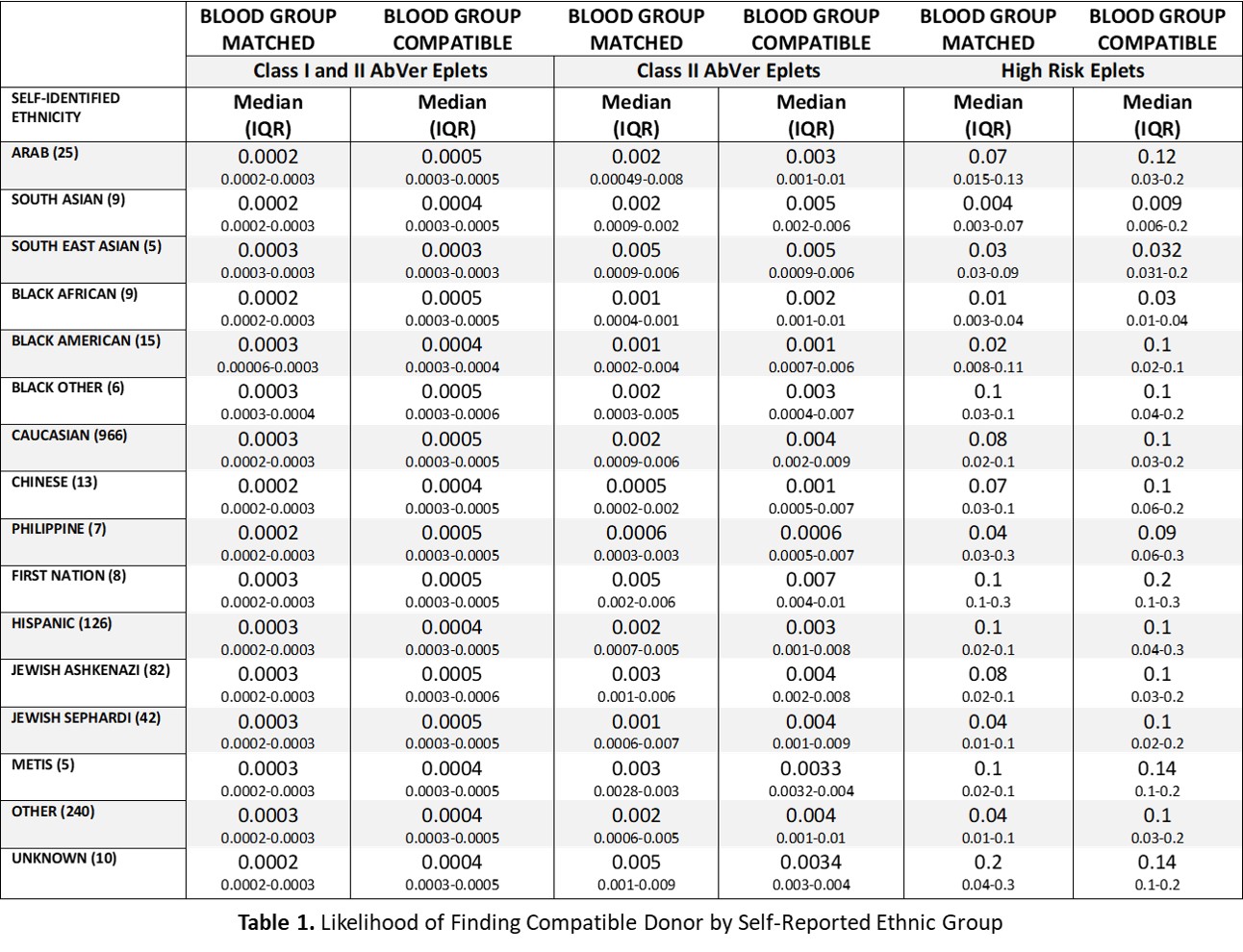The Calculated Panel of Incompatible Epitopes (cPIE) in the Service of Equitable Access to Transplantation
1McGill University, Montreal, QC, Canada, 2McGill University Health Centre, Montreal, QC, Canada, 3Hema-Quebec, Montreal, QC, Canada, 4Leiden University Medical Centre, Albinusdreef, Netherlands, 5University of British Columbia, Vancouver, BC, Canada, 6Medicine, McGill University Health Centre, Montreal, QC, Canada
Meeting: 2021 American Transplant Congress
Abstract number: LB 71
Keywords: Allocation, Donation, Epitopes, Histocompatibility
Topic: Clinical Science » Public Policy » Non-Organ Specific: Public Policy & Allocation
Session Information
Session Name: Non-Organ Specific: Public Policy & Allocation
Session Type: Poster Abstract
Session Date & Time: None. Available on demand.
Location: Virtual
*Purpose: To inform on feasibility of eplet matching, we developed the calculated Panel of Incompatible Epitopes (cPIE), an algorithm informing on the likelihood of identifying blood group and eplet-compatible donors. We applied cPIE to study how self-identified ethnicity may affect access to transplantation.
*Methods: Analyses were conducted in a subcohort of 1568 participants from the Hema-Quebec Stem Cell Registry (HQ) who underwent genotyping for 11 HLA loci by NGS (Jan 2018-Jan 2020). Genotypes were transformed to epitypes and blood groups were assigned randomly using distributions in self-reported ethnic groups of Quebec blood donors. Participants from the HQ subcohort with similar self-reported ethnicity represented candidate groups. The likelihood of finding blood group matched and eplet compatible donors was assessed by the cPIE algorithm considering eplet compatibility thresholds limited to antibody-verified (AbVer), HLA class II, and a subset of 15 eplet mismatches highly predictive of death-censored graft failure. For each threshold, donors from the entire HQ subcohort were deemed compatible, if all their eplets were included in the candidates’ epitypes. Distributions of cPIE were also assessed when considering blood group compatible donors.
*Results: The distribution of cPIE (Median and Interquartile Range (IQR)) by 16 self-identified ethnic groups represented in HQ (Arab (N=25), South Asian (N=9), South East Asian (N=5), Black African (N=9), Black American (N=15), Black Other (N=6), Caucasian (N=966), Chinese (N=13), Philippine (N=7), First Nation (N=8), Hispanic (N=126), Jewish Ashkenazi (N=82), Jewish Sephardi (N=42), Metis (N=5), Other (N=240), and Unknown (N=10)) for each eplet compatibility threshold are presented in Table 1. Likelihood of finding donors was greater when allowing blood group compatibility with candidates.
*Conclusions: Across self-identified ethnicities there is extensive heterogeneity at the individual level in the likelihood of identifying blood group and eplet-compatible donors. Verification of individual candidates’ allele-level HLA genotypes is needed to inform on access to transplantation. For harder to match candidates, blood group compatibility may help expand the donor pool.
To cite this abstract in AMA style:
Lamsatfi J, Liu BBingfan, Parto S, Lewin A, Oualkacha K, Claas F, Keown P, Sapir-Pichhadze R. The Calculated Panel of Incompatible Epitopes (cPIE) in the Service of Equitable Access to Transplantation [abstract]. Am J Transplant. 2021; 21 (suppl 3). https://atcmeetingabstracts.com/abstract/the-calculated-panel-of-incompatible-epitopes-cpie-in-the-service-of-equitable-access-to-transplantation/. Accessed February 27, 2026.« Back to 2021 American Transplant Congress

